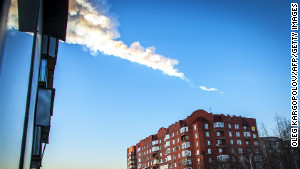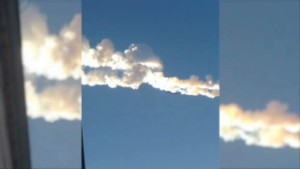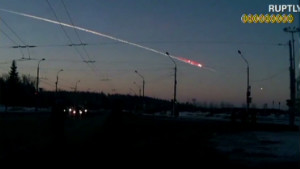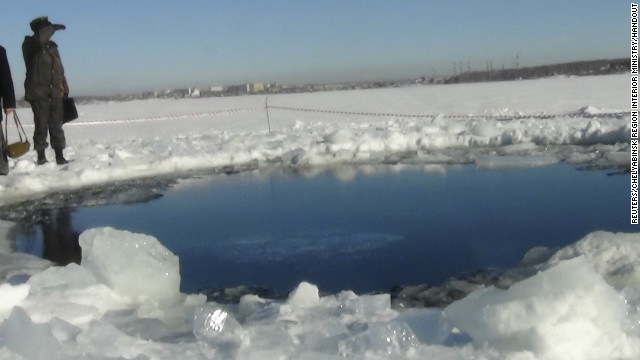Planet of sound: Meteor blast resonated around Earth
February 28, 2013 -- Updated 1433 GMT (2233 HKT)
'
'
--
CNN) -- The meteor that exploded over the steppes of southwestern Russia sent a low-frequency rumble bouncing through the Earth, giving scientists new clues about the biggest cosmic intruder in a century.
'
The big boom over
Chelyabinsk on February 15 also produced a wave of sound thousands of
times lower than a piano's middle C -- far below the range of human
hearing, according to the international agency that watches for nuclear
bomb tests. The Comprehensive Test Ban Treaty Organization said that sound wave showed up on sensors from Greenland to Antarctica, making it the largest ever detected by its network.
'
Scientists then used that
wave to calculate the size of the small asteroid that plunged to Earth,
said Margaret Campbell-Brown, an astronomer at Canada's University of
Western Ontario.
'
The duration of the wave
-- about 32 seconds -- let scientists estimate the energy of the blast
at between 450 and 500 kilotons, the size of about 30 early nuclear
bombs
 Meteor streaks through Russian skies
Meteor streaks through Russian skies
 Russian meteor was like 'a rocket bomb'
Russian meteor was like 'a rocket bomb'
-
 Over 100 tons of material falls daily
Over 100 tons of material falls daily
----
From there, Brown said, they could calculate the size of the fireball; and using an estimate of the meteor's speed from the numerous dashboard and mobile-phone cameras that captured the scene, it was "first-year physics" to figure out the approximate size and weight, she said.
From there, Brown said, they could calculate the size of the fireball; and using an estimate of the meteor's speed from the numerous dashboard and mobile-phone cameras that captured the scene, it was "first-year physics" to figure out the approximate size and weight, she said.
'
The latest estimate is
that the Chelyabinsk meteor was about 56 feet (17 meters) across,
weighed more than 7,000 tons and was moving about 18 kilometers per
second (40,000 mph) when it blew apart, she said.
"In terms of things we have observed, this is the largest since Tunguska," Brown said, referring to the suspected meteor that flattened a Siberian forest in 1908.
'
The nuclear test monitors
pick up "infrasound", or low frequency, waves from about 20 meteors a
year -- "if conditions are right, perhaps as small as a pea," she said.
Russian authorities say more than 1,500 people
were hurt, mostly by flying glass, when the Chelyabinsk meteor exploded
in spectacular fashion. Amateur video footage showed a bright white
streak moving rapidly across the sky before exploding with an even
brighter flash and a deafening bang.
'
Bill Cooke, head of
NASA's Meteoroid Environment Office, said scientists believe the object
originated in the asteroid belt between Mars and Jupiter. It was the
Apollo group of asteroids, which circle the sun in oblong orbits, that
occasionally cross Earth's.
'
Cooke said scientists
expect to study the Chelyabinsk event for months. But the dozens of
fragments that have been found so far point to a fairly common, stony
asteroid with traces of nickel and iron.
"The composition is not at all unusual as far as meteorites go," he said. "It was just very big."








No comments:
Post a Comment